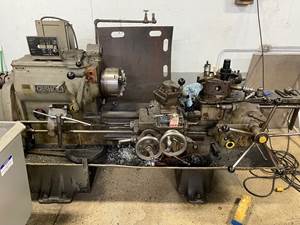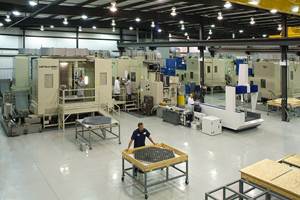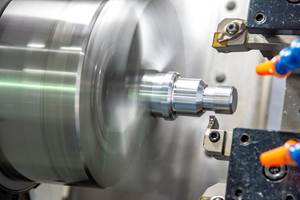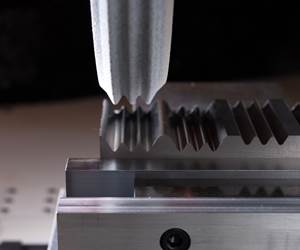A Highly Evolved Fab Shop
In today's manufacturing environment, it's survival of the fittest. This fab shop found that an automated fabricating cell was a natural selection. Continuing this process of evolution, a new species of job shop may emerge.
Through natural selection, living things adapt by evolving ways to cope with changes in their environment. Manufacturers also must deal with numerous changes to their environments by continuously exchanging old ideas for new. In the process, they too change, often evolving into a more sophisticated business.
AJL Manufacturing, Inc. (Rochester, New York) is a fabrication job shop that has evolved into a business that in many ways represents the best of its species. Its ability to embrace the vagaries of today's manufacturing environment by recognizing and then applying the appropriate technology has helped this shop not just to survive but to thrive and prosper.
This job shop has managed to design its manufacturing to fit the extended needs of their current customer base of 105 companies. Not only do they manufacture parts, but in many cases they help design and then assemble complex components for their customers. In effect, they've become a manufacturing extension for many of the customers they serve.
The results are a job shop that selects the work it does based on well defined parameters. Getting the company to this point wasn't easy. We talked to Rick Ponticello, AJL's vice president of sales and marketing, and Ed Sigel, company president, about how this shop evolved from very simple beginnings to become an example of what a job shop of the future may look like.
Origin Of The Species
AJL Manufacturing is a fabrication job shop specializing in making parts and assemblies for the paper processing industryfor copier, computer printer and check processing equipment makers. The business started with three people some 25 years ago. It originally built progressive dies and fixtures. The three partners would build the dies at night and service customers during the day.
AJL is a job shop. They take raw material, add value, and ultimately ship a usable product to a waiting customer. It's a very simple formula followed by every job shop. But AJL took that formula and refined it. Early on, the partners understood the importance of keeping the customer happy. They also learned that keeping the customer happy requires in depth understanding of jobs the shop should and should not quote on.
Although the three initial partners in AJL were die makers, it soon became obvious that commercial parts production had a better future for these guys than commercial die making. It was a natural progression. Because part of the die production process involved trying out the die sets, it was agreed that the young company could run some parts on the try-out presses too. Although the company still makes dies, they are used for producing customers' parts at AJL.
That early decision put AJL on a road that has led to 145 employees and a new 165,000-square-foot building, opening later this year. As the fabrication business grew, some customers asked AJL to do some simple assembly work. Simple assemblies grew more complex, and soon the company was supplying complete and complex assemblies for its major customers.
When the company decided to move beyond just bending parts, a pattern was established that continues today. They invested in the equipment and personnel to make good on the jobs they quoted.
For example, AJL has a screw machine department. It is captive to the fab shop and was installed to make the many fasteners and small parts needed in assemblies. Because leadtimes and quantities were not compatible with local suppliers, AJL set up its own department. AJL also owns a plastics processing company, which makes covers, buttons and other parts needed to manufacture line-ready assemblies for AJL's customers.
Understanding intimately the industry they serve allows the company to focus their investments. In effect, AJL is vertically integrating--making as much in-house as possible--to become an alternative source for jobs its customers no longer want to manufacture.
Filling A Vacuum
So how did AJL become such an integral vendor to its customers? Part of the answer is timing. There is a national push among many industries to move away from doing any but the most proprietary manufacturing in-house.
This has been particularly true in AJL's traditional markets, which include paper processing companies like Xerox, Kodak, the computer industry and others. Much of the general manufacturing work these companies once did themselves is now contracted out to shops like AJL.
These contract shops have become, quite literally, extensions of the OEM. It makes sense, particularly when there is a shop with well defined expertise, like AJL has developed. The company is a job shop, true, but it's a job shop serving a specific industry and providing specific skill sets--precision fabrications and assemblies for paper processing equipment manufacturers.
"We don't solicit simple angle brackets," says Mr. Ponticello. "We couldn't compete in many fabrication markets. Our niche is high precision metal parts and the capability to carry the work from prototype through production. This shop is set up to provide design, engineering, machining, stamping, welding, with mechanical and electro-mechanical assembly for that industry. A shop must be very aware of its own abilities. It must define its capabilities and be very careful to work within them. An unfulfillable promise to a customer is much worse than saying no."
AJL and companies like them have moved in to fill the manufacturing vacuum created by down-sizing initiatives implemented by many manufacturers. There is economy in this for the OEM. By contracting with specialty job shops, companies can concentrate on those components that differentiate them from their competitors. Leaving non-proprietary manufacturing to companies that specialize in general manufacturing makes sense.
Also in the plus column, AJL can generally deliver its contract work more cost effectively. Being knowledgeable about their industry, the learning curve is reduced. Because its overhead is defrayed across many customers, operating costs are often lower for the job shop than the OEM. An in-house operation requires similar capital and personnel investment as a job shop, but with only a single customer, costs are often higher.
The job shop is interested in general manufacturing. It's how the company makes its living. They are looking for better ways to do the job. One example, in AJL's case, was the application of pre-plated sheet metal. "We were among the first to use pre-plated sheet in the paper processing industry," says Mr. Ponticello. "We found it being used in an imported copy machine and investigated where to buy it for our customers."
Pre-plated sheet eliminates sending fabrications outside for plating. Work gets through the shop faster.
Job Shop Automation
For many contract or job shops, the difference between extinction and survival lies in the flexibility of process that yields good parts. But a job shop traditionally has had to maximize flexibility, which often minimizes automation. The key to successful application of automation is well defined production. That's why automotive suppliers can afford to invest in transfer lines and dedicated automation.
An advantage to defining a manufacturing area is that it simplifies the manufacturing process. Although each customer designs a part differently, from a job shop manufacturing perspective the work is similar. The shop is therefore designed to make these types of parts, which in turn simplifies automation. It's like family-of-parts manufacturing across an industry instead of a product line.
Cell As Nucleus
Cells are an answer for job shops like AJL. Because they have defined their industry and know the kinds of parts needed, they can generally predict their production to the point where cellular automation is practical. That's why the company invested in a highly automated punch press cell and plans on installing more.
"The only way to continue to grow our business is to invest in the best technology available," says Mr. Sigel. "Defining our manufacturing niche, and seeking work within it, means having the technology and process capability in place to meet delivery."
Mr. Ponticello agrees. "Our new plant is planned around cellular manufacturing," he says. "An example of that is our Amada cell, one of three in the country. The cell is built around a Vipros 357 hydraulic turret punch press. With 58 tool positions available on the turret, the cell can process seven programs sequentially. It pulls the necessary sheet metal stock from an adjacent storage rack."
Unique to this cell is selective shakeout. In most turret punch press operations, parts are manually shaken out of the skeleton when a sheet is processed. It's generally a two-person operation. When all the parts are loose, every single one must be gathered and sorted.
In AJL's cell, this process is automated. A programmed handling device picks each cut part from the skeleton and places it on an outbound skid. Identical parts are stacked or kits of parts are placed together on the skid. Any number of parts or kits of parts can be sorted this way.
This cellular arrangement allows AJL to operate untended or lightly tended shifts. Capacity for lights-out production on the punch press cell is eight or nine hours. It eliminates a shear operation because stock is purchased in 4 by 10-foot sheets instead of coils. Sheet stock is placed directly in one of six storage shelves located next to the machine.
The cell reduces the need for a full-time operator and with the sheet storage attached, material handling is reduced to keeping the storage shelves stocked. "It's technology like this that will keep us competitive," says Mr. Sigel.
Welding From Above
Welding is part of any fabrication shop's offerings. AJL uses robot welders extensively in their shop. Knowing the production requirements of its customers lets AJL use robot welders effectively. Stations are arranged in cells with work queued on shuttles. Two small robot welders take care of lower volume and overflow work.
The centerpiece of the robot welding operations is an ESAB robot cell. AJL added a twist to the manufacturer's specs, however, by mounting the robot inverted from a specially configured frame. Under the robot, the workzone is clear. The robot can move 360 degrees to access four work shuttle-stations that feed parts in and out of the cell.
These automated welding cells dovetail nicely with the punch press cell. "Increasing production in one area has a cascade effect on subsequent operations," says Mr. Ponticello. "To maintain smooth throughput and reduce work in-process bottlenecks, balance is needed between various cells."
Standardization
Upstream from the punch press cell are the presses. These too are designed around cellular manufacturing principles. While there are three individual presses with 300, 250 and 180 tons respectively for special jobs, most of the shop production moves across its five 150-ton Niagara presses.
"For our work, these presses are sized right," says Mr. Ponticello. Each has a 48 by 30-inch bed size. Using the same press size also allows AJL to standardize tooling. Tooling interchangeability simplifies machine utilization.
AJL has also standardized shop processes. In 1995 the shop was certified ISO 9002. "With 400 to 500 jobs on the shop floor at a time, getting a handle on our processes is not a luxury, it's a necessity," says Mr. Ponticello.
"ISO certification has helped mature our shop," continues Mr. Ponticello. "Now each operator is aware of their role in the entire manufacturing process. Mechanisms are in place for each shop person to ask questions and get answers. No longer do our people simply hand off work to the next station. Instead, through ISO training, they know operation sequences and how each operation impacts others down the line."
Customers too, have responded to AJL's certification. "It has eliminated initial plant inspection for new customers and our quality scorecards are at their highest with existing customers," says Mr. Ponticello. ISO has been good for AJL.
Snowball Effect
AJL's sheet metal bending and assembly business has inadvertently led them into contract metalcutting. While it's not a direction they chose, it has developed from the shop's goal of being a full-service provider to its customers.
"One year ago we had a single Hitachi Seiki CNC machining center in the shop," says Mr. Sigel. "Now we formed a machining cell with two Mazak vertical machining centers and four Prototrak mills."
Although the initial intention of forming this cell was to provide machined parts for the fabrication assemblies, sufficient contract business has taken them into jobbing out machining. "Some of our fabricating customers are asking us to provide machined parts in addition to the sheet metal work," adds Mr. Ponticello. It's a snowball effect.
Strengthening Their Position
Around 1991, AJL was close to 80 percent captive by a handful of major local companies. Cost reductions were mandated. "Our vulnerability was exposed," says Mr. Sigel.
This seminal event put AJL on track for diversifying its customer base. To become a full-service job shop for their industry, AJL has ventured out from its traditional base in Rochester. The local economy helped them develop skills that other companies in other locations also need.
Selecting their manufacturing niche and staying within it, sometimes to the exclusion of business, is a formula that has spelled success for AJL. Fully 30 percent of the company's business now comes from outside the Rochester area. At the same time, business in Rochester has continued to grow as the local manufacturers continue down-sizing.
The driver for this has been marketing. With a sales force of six direct employees, AJL now covers the United States from east of the Mississippi and south of Connecticut. "We're growing the sales force slowly, making sure the right people are in place," says Mr. Ponticello. "We use all the tools advertisements, trade shows, direct mail to tell potential customers who we are and what we can do."
Highly Evolved
AJL has become a very different company than it was originally. It has evolved, responding to changes in its customers' needs, while focusing its own efficiency to attract more customers. It's a sure bet that AJL will continue to adapt. They have become a very fit competitor in a business where the fittest survive. How evolved is your shop?
Related Content
Inside an Amish-Owned Family Machine Shop
Modern Machine Shop took an exclusive behind-the-scenes tour of an Amish-owned machine shop, where advanced machining technologies work alongside old-world traditions.
Read MoreVolumetric Accuracy Is Key to Machining James Webb Telescope
To meet the extreme tolerance of the telescope’s beryllium mirrors, the manufacturer had to rely on stable horizontal machining centers with a high degree of consistency volumetric accuracy.
Read MoreThreading On A Lathe
The right choices in tooling and technique can optimize the thread turning process.
Read More10 Things to Know About Creep-Feed Grinding
Because of the high material removal rate creep-feed grinding can deliver in challenging materials, grinding might not be just the last step in the process—it might be the process.
Read MoreRead Next
3 Mistakes That Cause CNC Programs to Fail
Despite enhancements to manufacturing technology, there are still issues today that can cause programs to fail. These failures can cause lost time, scrapped parts, damaged machines and even injured operators.
Read MoreThe Cut Scene: The Finer Details of Large-Format Machining
Small details and features can have an outsized impact on large parts, such as Barbco’s collapsible utility drill head.
Read More.jpg;maxWidth=970;quality=90)




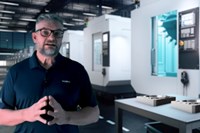



.jpg;maxWidth=300;quality=90)
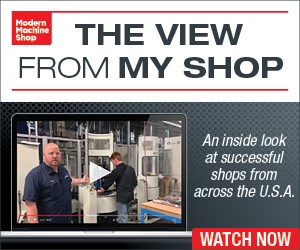



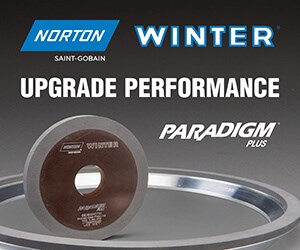
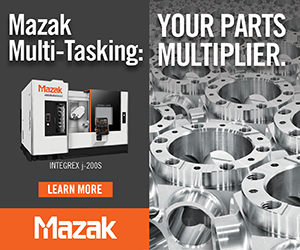




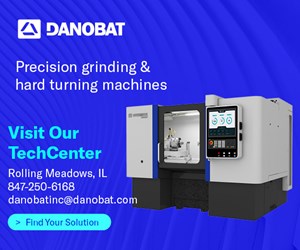


.png;maxWidth=300;quality=90)
